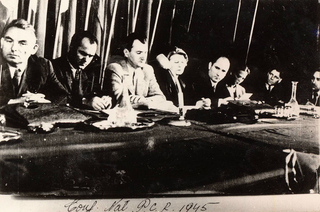| |||||
| Decades: | |||||
|---|---|---|---|---|---|
| See also: | |||||
Events from the year 1943 in Romania. The year was dominated by the Second World War.
| |||||
| Decades: | |||||
|---|---|---|---|---|---|
| See also: | |||||
Events from the year 1943 in Romania. The year was dominated by the Second World War.
Nicolae Hönigsberg was a Romanian footballer of Hungarian and Jewish ethnicity. He competed in the men's tournament at the 1924 Summer Olympics. Hönigsberg, who was also known at that time under the name of Kinigli, was born when Oradea was part of Austria-Hungary and played his entire career for the local football club, Club Atletic Oradea, in 53 league matches and scored 18 goals.

Events from the year 1945 in Romania. The year saw the end of Romania's involvement in World War II and the foundation of the pro-Communist government of Petru Groza.
Events from the year 1944 in Romania. The year was dominated by the Second World War. The year started with the Soviet Army assault on Romanian troops and the Battle of Romania. King Michael led a coup d'état during the year and Romania left the Axis powers and joined the Allies. The Romanian army subsequently won victories against German and Hungarian troops.
Events from the year 1946 in Romania. The year started with the end of the royal strike and ended with the Romanian Communist Party win the first election following the introduction of women's suffrage.
Events from the year 1939 in Romania. The year saw the assassination of Armand Călinescu.
Events from the year 1938 in Romania. A self-coup and subsequent new constitution make Carol II a royal dictator.
Events from the year 1955 in Romania. The year saw the country join the United Nations and Warsaw Pact, the latter as a founder. Amongst notable people who died during the year was composer George Enescu.
Events from the year 1935 in Romania. The year saw the foundation of the Romanian Academy of Sciences.
Events from the year 1956 in Romania. At the University of Bucharest, students demonstrated in support of the Hungarian Revolution. The year also saw the end of the last SovRom joint enterprises and the first broadcast from TVR, Romania's first TV network.

Events from the year 1957 in Romania. During the year, Romania hosted the first European competition for female artistic gymnastics. The country enacted laws to ban prostitution and slavery, and provide for abortion on demand. Notable deaths include the sculptor Constantin Brâncuși.
Events from the year 1958 in Romania. The year saw the end of the Soviet occupation of Romania with the last Soviet troops leaving the country.
Events from the year 1959 in Romania. During the year, the country hosted the first International Mathematical Olympiad.
Events from the year 1931 in Romania. The year was dominated by the Great Depression.
Events from the year 1960 in Romania. At the 1960 Summer Olympics, Iolanda Balaș wins the first Romanian Olympic gold medal.
Events from the year 1961 in Romania. The year saw the creation of the title of President of the State Council for the de facto head of state. The first office holder was Gheorghe Gheorghiu-Dej, who was already General Secretary of the Romanian Communist Party.
Events from the year 1962 in Romania. The year saw the end of the collectivization of agriculture and increasing de-satellization of Communist Romania as the country last publicly supported the Soviet Union against China and took part is Warsaw Pact army exercises.
Events from the year 1964 in Romania. The year saw increasing separation from Soviet influence.
Events from the year 1963 in Romania. The year saw the continued de-satellization of Communist Romania.